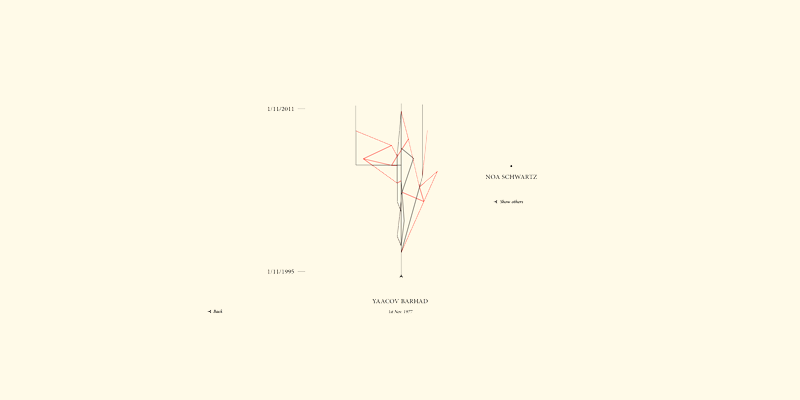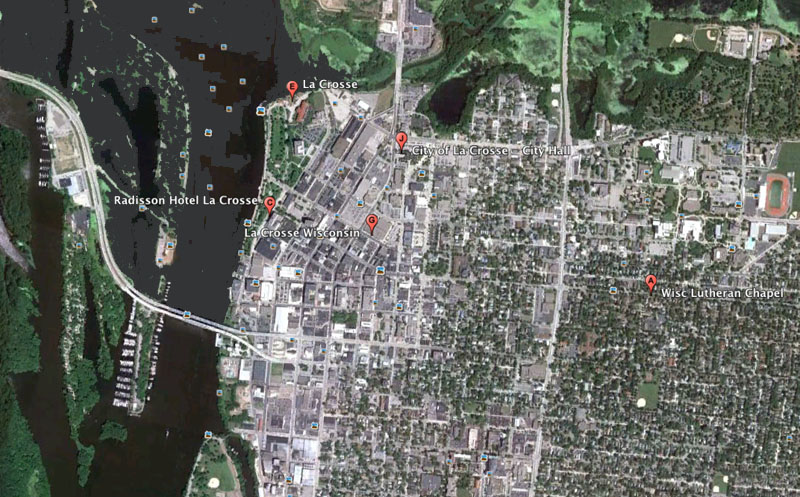
Ref: Google Glass (via #Algopop)
New computer technology that can predict traffic patterns could help ease congestion on busy roads, tech giant IBM announced November 14.
The company is wrapping up research on its new “predictive traffic management technology,” developed and tested in Lyons, France.
The technology – IBM calls it a Decision Support System Optimizer (DSSO) – uses real-time traffic data to predict the best way to keep cars moving when a gridlock-sparking incident happens, reports Mashable.
In fact, DSSO can even help cities “anticipate and avoid many traffic jams before they happen, and lessen their impact on citizens,” Lyons mayor Gerard Collomb said in a statement.
While modern transportation centres often have incident response plans and techniques they can employ to prevent bottle-necking, they’re unable to factor past and future traffic patterns into their actions, IBM points out.
Not only does the DSSO’s algorithms use historical traffic data to predict future patterns, it also “learns” from the implementation of successful traffic management plans.
Ref: IBM Software Predicts Traffic Jams, Stops Them – Sympatico
We continually scan tens of thousands of high-quality, online news publications, blogs, public niche sources, trade publications, government web sites, financial databases and more.
From these open web sites, we identify references to entities and events. These are organized in time by extracting publication date and any temporal expressions in the text. Each reference is linked to the original source and measured for online momentum and tone of language: positive or negative sentiment.
Ref: RecordedFuture

Sometimes, even after a murder conviction, some see reasonable doubt that the conviction was a righteous one.
Such is the case in the murder of Dennis and Merna Koula in La Cross, Wisc, a quiet community.
[…]
A neighbor of the Koula’s, Steve Burgess, freely admitted that he had received death threats. He was the president of a local bank.
And, as the CBS News investigation indicated (embedded, but there are some gaps in the audio), if you use Google Earth to locate Burgess’ house, you get a surprise.
“48 Hours” correspondent Peter Van Sant said: “In fact, when you Google Earth Steve Burgess’ address…the zoom into the house goes to the Koula’s house, not to Steve Burgess’ house.”
Police say they discounted the threatening caller, as they located him and he had an alibi. But then could that individual have hired someone to do any allegedly required dirty work, a person who used Google Earth to go to the wrong house?
Ref: Did Google Earth error send murderer to wrong address? – CNET
In 1948 a Dominican friar, Père Dubarle, wrote a review of Norbert Wiener book Cybernetics. In this article, he introduces a very interesting word “machines à gouverner”. Père Dubarle warns us against potential risks of having blind faith towards new sciences (machines/computers in this case) because human processes can’t be predicted with “cold mathematics”.
One of the most fascinating prospects thus opened is that of the rational conduct of human affairs, and in particular of those which interest communities and seem to present a certain statistical regularity, such as the human phenomena of the development of opinion. Can’t one imagine a machine to collect this or that type of information, as for example information on production and the market; and then to determine as a function of the average psychology of human beings, and of the ‘i quantities which it is possible to measure in a determined instance, what the most probable development of the situation might be? Can’t one even conceive a State ap paratus covering all systems of political decisions, either under a regime of many states distributed over the earth, or under the apparently much more simple regime of a human government of this planet? At present nothing prevents our thinking of this. We may dream of the time when the machine a gouverner may come to supply whether for good or evil – the present obvious inadequacy of the brain when the latter is concerned with the customary machinery of politics.
At all events, human realities do not admit a sharp and certain determination, as numerical data of computation do. They only admit the determination of their prob able values. A machine to treat these processes, and the problems which they put, must therefore undertake the sort of probabilistic, rather than deterministic thought, such as is .exhibited for example in modem computing machines . This makes its task more complicated, but does not render it impossible. The prediction machine which determines the efficacy of anti-aircraft fire is an example of this. Theoretically, time prediction is not im possible; neither is the determination of the most favor able decision, at least within certain limits. The possibility of playing machines such as the chess-playing machine is considered to establish this. For the human processes which constitute the object of government may be assimilated to games in the sense in which von Neu mann has studied them mathematically. Even though these games have an incomplete set of rules, there are other games with a very large number of players, where the data are extremely complex. The machines a gouverner will define the State as the best-informed player at each particular level; and the State is the only su preme co-ordinator of all partial decisions. These are enormous privileges; if they are acquired scientifically, they will permit the State under all circumstances to beat every player of a human game other than itself by offering this dilemma: either immediate ruin, or planned co-operation. This will be the consequences of the game itself without outside violence. The lovers of the best of worlds have something indeed to dream of!
Despite all this, and perhaps fortunately, the machine a gouverner is not ready for a very near tomorrow. For outside of the very serious problems which the volume of information to be collected and to be treated rapidly still put, the problems of the stability of prediction re main beyond what we can seriously dream of controlling. For human processes are assimilable to games with in completely defined rules, and above all, with the rules themselves functions of the time. The variation of the rules depends both on the effective detail of the situations engendered by the game itself, and on the system of psychological reactions of the players in the face of the results obtained at each instant.
It may even be more rapid than these. A very good example of this seems to be given by what happened to the Gallup Poll in the 1948 election. All this not only tends to complicate the degree of the factors which influence prediction, but perhaps to make radically sterile the mechanical manipulation of human situations. As far as one can judge, only two conditions here can guarantee stabilization in the mathematical sense of the term. These are, on the one hand, a sufficient ignorance on the part of the mass of the players exploited by a skilled player, who moreover may plan a method of paralyzing the consciousness of the masses; or on the other, sufficient good-will to allow one, for the sake of the stability of the game, to refer his decisions to one or a few players of the game who have arbitrary privileges. This is a hard lesson of cold mathematics, but it throws a certain light on the adventure of our century: hesitation between an indefinite turbulence of human affairs and the rise of a prodigious Leviathan. In comparison with this, Hobbes’ Leviathan was nothing but a pleasant joke. We are running the risk nowadays of a great World State, where deliberate and conscious primitive injustice may be the only possible condition for the statistical happiness of the masses: a world worse than hell for every clear mind. Perhaps it would not be a bad idea for the teams at present creating cybernetics to add to their cadre of technicians, who have come from all horizons of science, some serious anthropologists, and perhaps a philosopher who has some curiosity as to world matters.
WaterBar, 2011-2013
Without a doubt computing has changed private and personal lives. But how has it, might it, change the public realm?
The installation WaterBar is a public water-well designed for the post-sustainability age when clean water is simply not good enough.
WaterBar geoengineers mineralized water. It begins with a cleaning stage via an anthracite filter followed by a remineralization stage through a filter bank with select chemical properties. Water in contact with these filters receives measurable trace elements of magnesium, iron, calcium and other elements. But the filters also share, though origin and history, a connection to place. Water travels the world in endless cylces of evaportion and rainfall. A drop of water in Africa today may be a drop of water in Europe in the future. Waterbar accellerates the global flow of waters through many regions of the planet, and produces a drinkable water mix in the process. WaterBar includes quartz-rich granite from Inada by Fukushima, home of the latest devastating high-tech catastrophe; sandstone from La Verna, Italy, where St. Francis cared for the poor; marble from Thassos Greece, source of art and architecture and the beginning and possible end of democracy; limestone from Jerusalem/Hebron, Israel, a place of eternal conflict and shared hopes; and basalt from Mount Merapi, Indonesia, an unpredictable, active volcano. An internet-scanning, text-processing control system continuously circulates water through these filters, exposing the water to trace elements of the minerals and rocks. An algorithm mixes these remineralized waters in proportion to the intensity of related problems found in pertinent realtime online news to a daily mineralized water mix, the catch of the day. This mix is then offered for public consumption as an antidote to the bad news on water of the day, and available only as long as limited supplies last.
MicroPublicSpaces, 2009-2011
MicroPublicPlaces (mpps) are a response to two strong global vectors: the rise of pervasive information processing technologies and the privatization of public matters. Mpps bend information systems to offer better access to what we all need: air, water, quiet places, information and more.
A Nature Interpretation Center with Second Thoughts, 2002 – 2003
UNSEEN is a nature interpretation center with second thoughts. Set in the Reford Gardens of Grand-Métis on the Gaspé Peninsula of eastern Québec, the multi-camera real time machine vision system observes select plants indigenous to the region. The Dogwood, the Wild Sarsaparilla, the Harebell, the Foamflower, the Wild Columbine, the Garden Columbine, the Alpine Woodsia, the Lowbush Blueberry and the Canadian Burnet are under continued observation during the entire summer. Using data analysis and classification techniques, the system searches for instances of these plants. Short texts depict factual knowledge on the select plants. Over the course of the summer, however, the flavour of the texts changes. As the initially sparse garden grows luscious, the system alters the nature of the texts from descriptive to hypothetical, confronting the visitor with imagined future plant scenarios. Which types of knowing are valid here? UNSEEN is a patient observer designed to make you unfamiliar with plants.
Fridge Companion, 2001 – 2002
Fridge Companion is an information appliance designed not to make domestic life easier but warmer. It monitors ambient temperature in and outside of the refrigerator, maps the data over time and gives, at its owner’s request, periodic but very informal lectures on the laws of thermodynamics, including love.